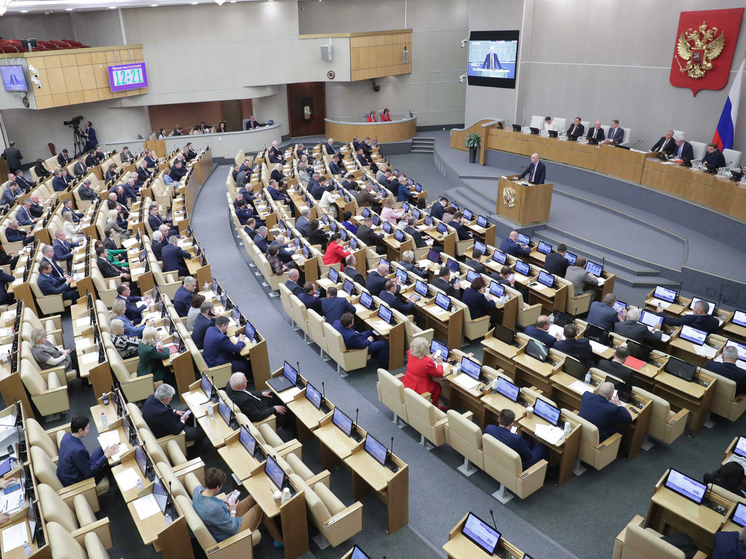Finance Minister Siluanov assured deputies that there are no problems with money
The State Duma at a plenary session on Thursday approved “without noise and dust” the draft federal budget for 2024-2026 in the first reading . Any other scenario was a priori impossible. 320 deputies voted “for”, 80 “against”, and there were no abstentions. “All the tasks set by the president to support citizens are taken into account in the budget and the necessary resources are also provided,” reported Finance Minister Anton Siluanov, presenting Russia’s main financial document for the next three years.
 Photo: duma.gov.ru
Photo: duma.gov.ru
In fact, people from the audience turned to him with the same question: “Do you have any money?” «Of course have!» — the minister retorted without blinking an eye. He began, of course, with the thesis expected by everyone: the absolute priority in 2024 will be strengthening the country’s defense capability and supporting the participants of the Northern Military District. “The resources planned for 2024 have been determined jointly with the departments of the security bloc and will allow us to solve the problems of supplying weapons and military equipment, logistics and social support for military personnel,” Siluanov said.
Almost 11 trillion rubles are allocated for national defense: this is 29% of all budget expenditures, whereas before the start of the SVO they were 14%, the minister said. In addition, according to him, in 2024 a state fund will be created in Russia to support participants in the special operation — 30 billion rubles will be allocated over three years. As for total budget expenditures, next year they will reach 36.6 trillion rubles — twice as much as in 2019. “A huge resource!” — the speaker noted. Another priority for the treasury will be the fulfillment of all social obligations: in particular, in 2024, it is planned to index the pensions of non-working pensioners by 7.5%, as well as ensure payments of social benefits and maternity capital.
Siluanov spoke a lot about promising projects to “create a modern civil industry,” our own microelectronics and aviation industry (in particular, new engines for aircraft). For these purposes, the budget provides 2.7 trillion rubles over a three-year period. When the minister was about to leave the podium, he was stopped by Vyacheslav Volodin.
“Anton Germanovich, wait, don’t leave! – the speaker of the State Duma addressed Siluanov. — Please answer the question: does the main financial law solve the issue of overcoming challenges (one), developing the country (two) and, most importantly, ensuring social obligations, of which there will be more? The President has set such tasks, we must solve them by reflecting them in the budget. This is what people care about, everyone.”
The answer given was as extensive as possible. According to Siluanov, “the concentration of resources in these three areas… is reflected in the project and is provided with the necessary funding.” In general, the deputy corps did not torment the minister with uncomfortable questions. It is possible to single out, perhaps, only a clearly skeptical remark from the representative of the Right Russia faction Valery Hartung.
“Of course, your statement that the budget fulfills all its social obligations inspires optimism,” the deputy noted. — But if you recalculate the minimum living wage depending on the median income, and not on the cost of the consumer basket, then, of course, you will need less and less money to meet the minimum wage. Tell me, if you considered the minimum wage fairly, where could you find the money for this obligation? And how do you evaluate our proposal to cancel the tax maneuver in the oil industry, which would lead to saving trillions of rubles in the budget?
In turn, LDPR deputy Yaroslav Nilov touched upon the frankly unpleasant topic for the Ministry of Finance of indexation of pensions for working pensioners. Having proposed to consider this “quite costly, but fundamental issue” in relation to at least healthcare workers, social workers, and working disabled people, Nilov did not meet with understanding from Siluanov. “It turns out that we are segmenting working pensioners by individual professions,” he replied.
Meanwhile, earlier the State Duma Committee on Budget and Taxes tore to smithereens the draft main directions of budget, tax and customs tariff policy submitted to parliament. Members of the committee considered that this document, prepared by the Ministry of Finance and submitted to parliament along with the main draft federal budget, “does not reflect the real tasks of the country.” The review speaks of a return “to the practice of tax terror.” We are talking about the task initiated by Siluanov for the Federal Tax Service (FTS) and the Federal Customs Service (FCS) to increase the collection of taxes and fees by 500 billion rubles.
“The main directions are meaningless and vacuous material that does not reflect the real new tasks of budget and tax policy that must be fulfilled in the next budget cycle,” states the relevant Duma committee. Nikolai Arefiev, deputy head of the State Duma Committee on Economic Policy, spoke no less interestingly (at a briefing before the plenary meeting on Thursday, October 26). According to him, the social sphere is being destroyed in the regions, health care is especially suffering — the number of doctors, hospitals and first aid stations — medical and obstetric centers — is being reduced.
“People write to us that you need to make an appointment with a doctor 3 days in advance “4 months, but you won’t be able to get to specialists at all,” Arefiev noted. – Our economy and social sphere are dying on two “safety cushions” — gold and foreign exchange reserves and the National Welfare Fund, which today is 13 trillion rubles. It’s better to remove these “cushions” by consolidating all the funds in the budget.”
However, this criticism did not in any way affect the results of the parliamentary vote for the budget in the first reading.


